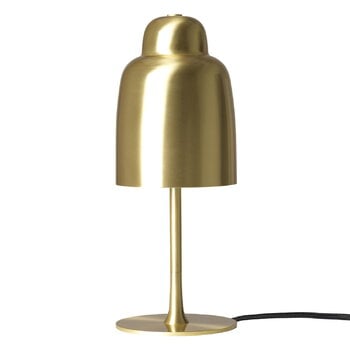Pholc's Champagne table lamp features a charming metal shade that designer Monika Mulder drew while the brand's founder and product developer was visiting her studio. Mulder's aim was to create a small luminaire with a contemporary and straightforward design – and she certainly succeeded! The Champagne table lamp complements both classic and more modern décors with its elegant and timeless shape.
Champagne table lamp, brushed gold
Pholc
Description
Pholc's Champagne table lamp features a charming metal shade that designer Monika Mulder drew while the brand's founder and product developer was visiting her studio. Mulder's aim was to create a small luminaire with a contemporary and straightforward design – and she certainly succeeded! The Champagne table lamp complements both classic and more modern décors with its elegant and timeless shape.
Product details (20)
- Material
- Steel
- Colour
- Gold
- Width
- 12 cm
- Diameter
- 12 cm
- Height
- 30 cm
- Bulb base
- G9
- Light source
- Max 20W (not included)
- IP rating
- 20
- Protection class
- II
- Voltage
- 220–230 V
- Nominal frequency
- 50–60 Hz
- Certifications and labels
- CE, UKCA
- Plug
- EU plug
- Cable length
- 200 cm
- Cable colour
- Black
- Cable material
- Textile
- Weight
- 1 kg
- Integrated switch
- Yes
- Dimmable
- No
- Care instructions
- Wipe with a dry cloth
- Product ID
Designer
Monika Mulder (b. 1972) is a Dutch designer who graduated from Design Academy Eindhoven in 1997. Mulder started her career at the design department of IKEA, and since 2007 she has run her own design studio in Gothenburg, with customers such as the design lamp brand Pholc. In her design, Mulder emphasizes the sculptural elements of objects, and wants to combine smooth functionality with beauty and playfulness. Mulder’s work has been awarded with prizes such as the Best Furniture of the Year 2003 and Best Lamp of the Year 2017 in the Elle Decoration Swedish Design Awards.
View all productsReviews (0)
Sustainability
The Product Sustainability Framework, our criteria of sustainable design, helps you find the most sustainable products in our selection. Read below which sustainability criteria this product has met.
Working conditions & labour 7/9
-
Equal opportunities for all employees
-
Commitment to UN Global Compact, fair compensation for all employees
-
Corporate responsibility requirements defined and communicated for suppliers
-
Systematic work for improved inclusion and well-being in the workplace
-
Transparent supply chain
-
Direct suppliers audited and certified
-
Compliance to the UN Guiding Principles on Business and Human Rights ensured in the supply chain
-
Suppliers' compliance to a code of conduct ensured
-
Support for community involvement in the supply chain
Eco-friendly production 6/9
-
Fair and resource-wise water-use in production
-
No incineration or landfilling of returned items
-
No use of endangered species as materials
-
No direct environmental emissions or waste (excl. GHGs) from production
-
Material-efficient and ecological packaging
-
No potentially harmful chemicals used in own production
-
The sustainability of direct suppliers' production is addressed and monitored
-
Production and material sourcing that respect biodiversity, animal rights, and natural ecosystems
-
Positive impact on nature’s well-being through operations that regenerate natural ecosystems
Climate impact 4/8
-
Company's direct greenhouse gas emissions identified and commitment to reduction
-
Product's carbon impact identified and commitment to reduction
-
Guidance on energy- and eco-efficient use of the product
-
Low-carbon or compensated transportation
-
Contribution to climate initiatives beyond the brand’s direct operations
-
Carbon footprint of the product calculated and goals set to reduce it
-
100 % renewable energy in own production and operations
-
Carbon neutral or carbon negative product
Sustainable materials 5/6
-
Sustainable and long-lasting material choices
-
No harmful or hazardous substances
-
Responsible raw material sourcing and production
-
Materials suited for circularity: monomaterials, recyclable finishings, renewable or recycled contents etc.
-
Ecological materials: natural, biodegradable, recyclable or recycled contents
-
Outstanding materials in terms of innovativeness, responsibility, sustainability and circularity: local production or sourcing, 100 % recycled content, C2C-certification etc.
Circular design 4/5
-
High aesthetic quality promoting long-term use of the product
-
Technically durable product design and material choices
-
Design for enduring life-long quality
-
Design and support for product maintenance, repair and upgradability
-
Innovative circular design solutions: circular service system, resale platform, remanufacturing, collection of used products, etc.




